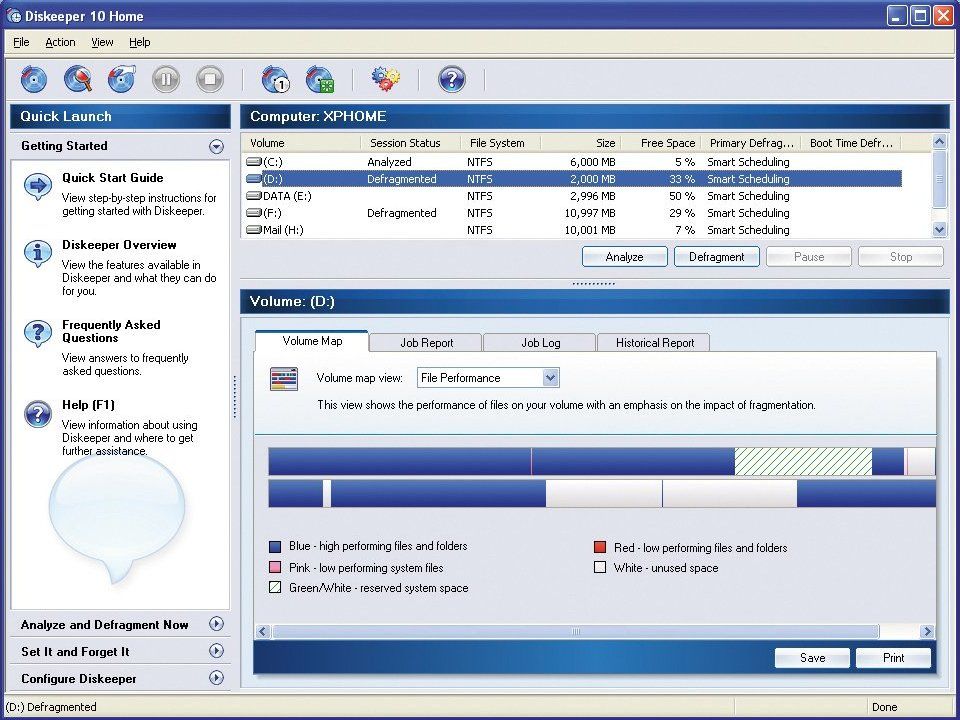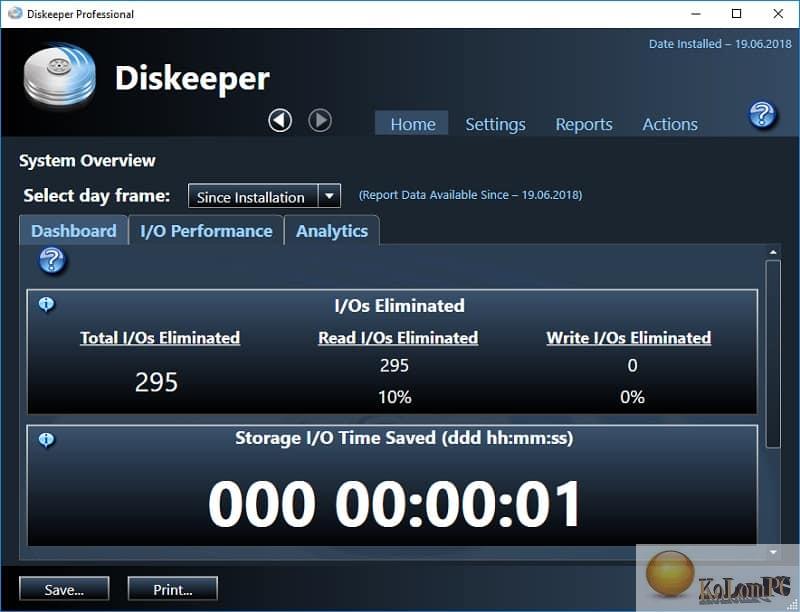


The Diskeeper family of products offers specialized automatic defragmentation of Windows operating systems ranging from Windows 2000 through Windows XP, Windows Vista, Windows Home Server and Windows Server 2003 Datacenter.įor the record, running Diskeeper for a few days made a small but noticeable difference in the performance of my test machine. The only reason I had to refer to the online documentation was to understand the details behind some of the features. All of these features are well-organized on a highly visual dashboard that makes implementing specific tasks easy. If the computer is in active use during defragmentation, this can make the difference between adequate user response and general frustration. The product also offers a command-line interface, which you can run as part of a batch process, much the same way it would be done if it was part of a login script.įor manual operations, such as my initial scan, Diskeeper provides the ability to set the disk and CPU priorities at which manual defragmentation jobs run. For example, you can manage Diskeeper client settings through Active Directory Group Policy Objects. Diskeeper also provides more detailed information on the state of the disk than does the Windows tool.ĭiskeeper provides you with ways of automating desktop tasks that have to do with hard disks. I had no real basis for comparison on the initial defragmentation, as I could not easily reproduce the same defragmentation state, but based on experience, the defragmentation process also appeared to be a little faster. The one thing I noted about Diskeeper is that it ran its defragmentation analysis significantly faster than the Windows defragmentation tool, telling me that my disk was performing poorly. It can also monitor and defragment the Master File Table (MFT) on NTFS volumes and paging files. This is likely to improve boot time, as you can defragment and move system files to more advantageous locations, resulting in a faster fetch time from the disk. It does this by moving files at boot time, before those files are executed and become locked in place. One unique feature is that Diskeeper can defrag system files that can't normally be relocated in storage. Given that most disks these days are formatted as NTFS, this shouldn't be a significant restriction. I-FAAST works only on NTFS volumes, and must have automatic defragmentation turned on. It then sequences those files on the disk so they can be fetched more quickly. I-FAAST works by running a set of benchmarks on the selected volumes to learn their individual performance characteristics, then monitors file access frequency on an ongoing basis in order to determine which files are requested most often. You can also turn on the product's Intelligent File Access Acceleration Sequencing Technology (I-FAAST), which claims to significantly improve file access and creation above and beyond the improvement provided by defragmentation alone. Diskeeper 2008 Pro Premier provides a highly visual view of the fragmentation status of your disk during analysis and defragmentation. The Diskeeper dashboard shows how InvisiTasking uses idle system resources (mostly CPU), and its results correlate closely with what I found using Perfmon.įigure 1. I examined CPU performance with Perfmon over a period of several hours while automatic defragmentation was turned on, and noted only a minimal (1 percent to 2 percent) use of the CPU during that time. InvisiTasking claims to use only otherwise unused system resources, so it will not negatively impact the performance of other applications on the system at any time. It also uses a technology it calls InvisiTasking to ensure minimal impact on system performance while automatic defragmentation is turned on. You can set it to continuously defragment your disk drives, allowing no degradation to happen. One of the biggest advantages of Diskeeper is automated operation. Despite some clever tricks to give the appearance of better performance, disk drives are still the big bottleneck in system performance. Because disk drives remain largely mechanical devices (the use of flash storage is growing, but drives with moving parts will command the lion's share of storage for years to come), they're by far the slowest parts of a computer. As hard disks keep getting higher and higher capacities, and we need more and more software to do our jobs, optimizing those disks can make a much bigger difference in the health and utility of our desktop systems. Diskeeper specializes in keeping your disk drive healthy and performing at a high level. I know this-and much more-about my disk because Diskeeper 2008 told me so. For example, it had a files-to-fragments ratio of almost 1:2, and the optimal ratio is more like 1:1:2. I had a poorly performing hard disk drive.


 0 kommentar(er)
0 kommentar(er)
